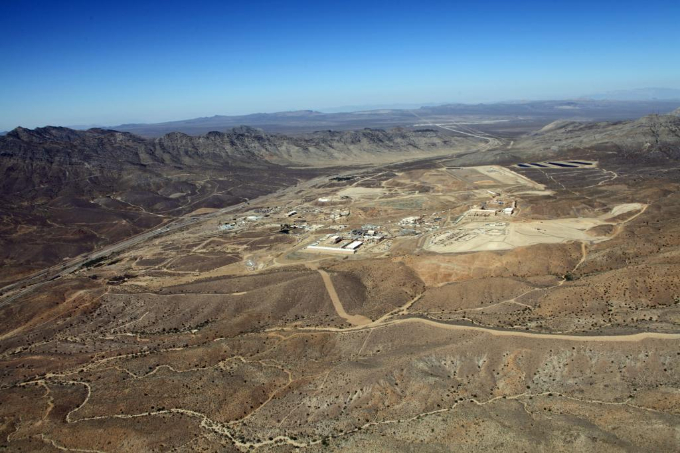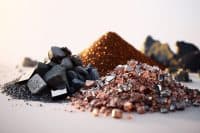
The U.S. Army is planning to fund the construction of a processing facility that will prepare rare earth minerals, with the ultimate goal of making weapons and electronic gear, according to an exclusive report from Reuters. A memo reviewed by Reuters claims the Army will fund up to two-thirds of the construction cost on at least one refinery and perhaps more.
The major source of rare earth minerals is China, which produces and refines most of the world’s supply of them. Earlier this year, the U.S. president ordered the Pentagon to expand its supply chain for rare earth elements (REEs), cautioning that relying on a foreign country for these strategic materials could harm U.S. defense programs.
The president’s action was the most recent in a series of studies that dates back several years. A 2013 report from the Congressional Research Service noted that the U.S. Department of Defense had adopted a “three-pronged strategy to secure supplies of [REEs, consisting of] diversification of supply, pursuit of substitutes, and reclamation of waste.” The Government Accountability Office (GAO) in 2016 found that the Pentagon “has not taken a comprehensive, department-wide approach to identifying which rare earths, if any, are critical to national security.”
The 17 minerals usually identified as rare earths are not really rare; they simply aren’t found in concentrations significant enough to make mining them profitable. The 17 minerals are grouped as either “light” or “heavy,” with the heavy REEs the scarcest and most valuable for defense applications.
More than 10 years ago, a company named Molycorp persuaded investors to put up hundreds of millions of dollars to reopen a California rare earths mine that had been opened originally in the early 1950s, before shutting down in 2002.
Molycorp’s stock soared to around $70 a share by 2012 before the company declared bankruptcy in 2016. The mine, known as Mountain Pass, was sold to two U.S. private equity funds operating under the name MP Materials. The company is currently producing a concentrate of light REEs but expects to be producing separated Neodymium and Praseodymium oxide, along with Lanthanum and Cerius oxides and carbonates, and a concentrate of so-called heavy rare earths by the end of 2020.
For defense purposes, REEs are used in missile guidance and control systems, smart bombs, Predator drones, F-35 Joint Strike Fighter planes and other high-tech weapons and systems.
Rare earth magnets are also used extensively in wind turbines, a market that MP Materials expects to account for about 30% of global growth in the demand for magnets made from REEs. Electric vehicles also use REEs as do smartphones.
According to Reuters, the Army unit in charge of munitions has asked REE mining companies for proposals to build a pilot plant to produce the heavy REEs. At least three bids are expected for the pilot plant: UCore Rare Metals; Texas Mineral Resources and a joint venture between Australia’s Lynas and privately held U.S. firm Blue Line. Lynas and Blue Line already have agreed to build a heavy REE separation plant in Texas that may be followed by a light REE separation nearby.
Industry executives told Reuters that a rare earths pilot plant could cost between $5 million and $20 million, and a full-scale plant could cost more than $100 million.
The Pentagon also may have to help finance a U.S.-based plant to manufacture rare earth magnets. Ryan Castilloux, managing director of a rare earths industry research firm, told Reuters, “Closing the magnet gap would do more to address the nation’s defense needs, and as well the needs of electric vehicle makers and others.”
The Average American Has No Idea How Much Money You Can Make Today (Sponsor)
The last few years made people forget how much banks and CD’s can pay. Meanwhile, interest rates have spiked and many can afford to pay you much more, but most are keeping yields low and hoping you won’t notice.
But there is good news. To win qualified customers, some accounts are paying almost 10x the national average! That’s an incredible way to keep your money safe and earn more at the same time. Our top pick for high yield savings accounts includes other benefits as well. You can earn up to 3.80% with a Checking & Savings Account today Sign up and get up to $300 with direct deposit. No account fees. FDIC Insured.
Click here to see how much more you could be earning on your savings today. It takes just a few minutes to open an account to make your money work for you.
Our top pick for high yield savings accounts includes other benefits as well. You can earn up to 4.00% with a Checking & Savings Account from Sofi. Sign up and get up to $300 with direct deposit. No account fees. FDIC Insured.
Thank you for reading! Have some feedback for us?
Contact the 24/7 Wall St. editorial team.



